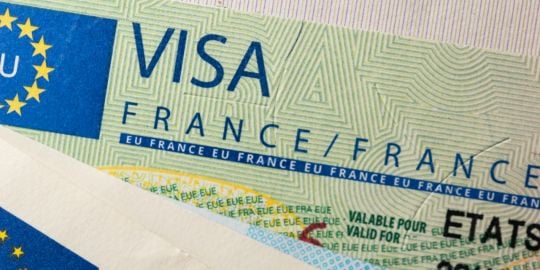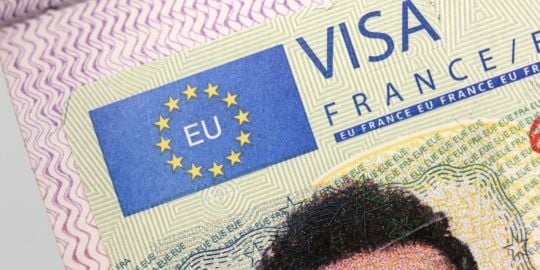Does anyone have advice on getting a long stay visa, Wife and I are retired U.S. Federal worker with Blue Cross Blue Shield health insurance that covers us overseas. Have good retirement incomes and will be living with daughter who has an apartment and who works for a French Company. We will be taking care of her children. Thank you in advance.
French long stay visa for retired U.S federal worker?
Hi -
If everything you list in your post is correct (insurance that covers you overseas, retirement income, living with family, etc.) , you should have absolutely no problem getting a long stay visa. They're good for up to a year, and you can fairly easily renew them (at a local French office) if all those détails still hold. Just go to the website for whichever French consulte is nearest you, and download the forms/requirements for 'long stay visa'.
Hi there,
My husband and I are both Australian but I think the same information would be required by the French authorities. We had to initially apply for a visa in our own country for 3 months, then go to our district capital (Montpellier) to have a medical check etc and our passports are stamped for a 12 month stay.
Each year for five years we have to renew our 12 month visa in the prefecture in Carcassonne - we live in the south of France. After 5 years, we can then apply for a long term visa (10 years). We are both retired, have income from Australia and private health insurance so our circumstances are not dissimilar. You might want to go to an English speaking lawyer who specialises on French visas - we did and got the loads of paperwork together so there was no problems.
We have resided in France for some 16 months and have purchased a property here - the French are sticklers for the right documentation - separate for each of you. Yes you each have have to supply bank statements, marriage certificate, proof of income - the whole works as they file you separately, not as a couple. Hope this helps - good luck.
cheers
Jennie
Some states will issue you a 6-month visa, some a full year.
You'll have to provide your daughter's address as your residence while in France, but I wouldn't mention that you'll be caring for her children, because some officials might think that means that you'd be getting paid.
Because you will not be allowed to work legally in France, you will have to prove that you can support yourselves during the given time frame - the amount you're required to keep in a French bank is equal to or more than twice the minimum-wage level in France (SMIC) for each person.
If this amount isn't available, you'll have to find someone to sponsor your needs while in France, make sure the money is in the bank, and who will have a notarized affidavit written and translated.
The problem will be finding a bank which will open an account for Americans. Barclays is one possibility, if there is a branch near you. This is becoming virtually impossible - perhaps your daughter could look into using her bank.
Your insurance must also cover all repatriation costs. If it doesn't, find out if it can be added, or look for additional insurance.
There is a list of paperwork available online for US citizens wishing to acquire a long-term visa - you'll have to have marriage certificates, birth certificates and other papers notarized, translated and stamped by an official translator - about 60 USD/page.
You'll have to make an appointment ahead of time at the regional Consulate nearest you. Bring all the paperwork and hope that you are approved. If you meet all the criteria and produce everything that the agents ask for, it's likely that you will be approved in a couple of weeks.
You must also go online to this site: https://www.service-public.fr/particuli … roits/N110
and follow the instructions for making the appointment and the paperwork required when you arrive in France, then follow through with the Immigration Office (OFFI), making an appointment as soon as you arrive in France, then assembling the paperwork and tax stamps: http://www.ofii.fr/venir_en_france_obte … s_915.html
Don't misplace any paperwork anyone gives you - you must keep the original and a copy for 10 years.
Like you, I am a retired federal worker who has been living in France with my wife for almost 4 years.
Another reply here informed you:
"Because you will not be allowed to work legally in France, you will have to prove that you can support yourselves during the given time frame - the amount you're required to keep in a French bank is equal to or more than twice the minimum-wage level in France (SMIC) for each person.
If this amount isn't available, you'll have to find someone to sponsor your needs while in France, make sure the money is in the bank, and who will have a notarized affidavit written and translated."
While you will have to provide proof of your resources, I have never been required to maintain a French bank account. This might apply to someone else but, as I say, this was not a requirement for us. You will not need a sponsor. This writer might be confusing this with a requirement that you provide documentation of a certain minimum amount of month income which should be no problem.
"Your insurance must also cover all repatriation costs. If it doesn't, find out if it can be added, or look for additional insurance."
I have no idea where this comes from but it has never been required of us.
We lived in Florida and the closest consulate was in Miami. There is also a link on the website of the French Embassy in Washington that can direct you to the proper forms.
It is correct that you might have trouble opening a bank account and this is all due to a law passed a few years ago known as FATCA. It has been created problems for a lot of Americans living overseas so it might be a good idea to familiarize yourself with this. We bank with Barclays but have had some other issues with US based banks due to this. I will mention this, though, if you have funds in the TSP, they will not be affected by this. I had a TSP account which I foolishly rolled into an IRA. After FATCA, I was forced to close my IRA and all other investment accounts I held with USAA and had a terrible time trying to find anyone to take us. The Patriot Act also has something to do with this.
Please don't be unduly alarmed by this but it is something you need to be aware of.
On the bright side, the visa process wasn't any worse than any DMV experience I've ever had and because you are Americans you will be welcome here. Err on the the side of too much documentation. If you're going to be living in Paris, you might not have too much trouble if you don't speak French. I could not speak French before we came here and it is a struggle. My wife speaks it well but as you know, the language of bureaucracy can be difficult.
The first visa will come from the immigration office but is easily renewed each year at the local prefecture.
Good luck.
I mentioned re-patriation insurance for a good reason. It's better to have this, than to pay the expenses you will occur if something unfortunate happens.
If you become injured or ill while in France, you'll be treated first and will pay later, though you will not be able to benefit from the French social security system.
However, if you should require a joint replacement, or any treatment which is not immediately necessary in the eyes of a French doctor, you will have to wait a long time to receive the operation. Thus, you might opt to return home for treatment.
If you or your wife should die while in France, and your family prefers that you be buried in the US, shipping your body home is complicated and will cost a fortune.
Unfortunately, I have dealt with both these issues.
Having a French bank account is advisable if you plan on staying a year or longer.
Living in France and transferring funds on a regular basis can become costly. The typical rate for a wire transfer (on both receiving and sending ends) is 40 EU. Now that FATCA is in effect, you have to justify large amounts to your French bank before they will accept the deposit.
Keeping a minimum amount (more than the SMIC for each person) is a condition required by my Prefecture in Paris. Some Prefectures may differ in their requirements, depending on where you live.
If you will use a credit or debit card for most of your transactions in France, including getting cash from ATMs, your US bank might charge you a percentage for each transaction, which adds up significantly. Before you arrive, you might think about changing banks, if this is the case.
Hi,
You need to get in touch with the French consulate, try to get a hold of one of the patient and friendly deputies and give them all the details of your retirement with the intention of buying a property in France for your retirement and they should help you with all the paper work.
In the past the laws were to give residence permits to any foreigner investing in real estate, I'm not sure about that now days and not updated.
But I'm sure it will not be an issue for you if you wish to retire in France, especially with a Federal background.
All the best for your retirement Sir.









